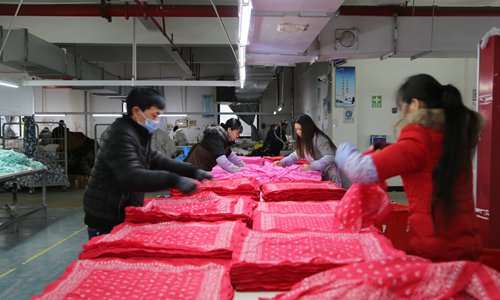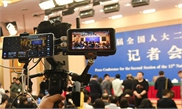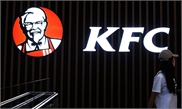SOURCE / INDUSTRIES
E. China export hub offers travel incentives to attract workers amid epidemic

Workers are stacking red kerchiefs at a production line of Yiwu-based Xize Fashion Scarf, which works as original equipment manufacturer for US companies like Gap and Macy's. File Photo: Chen Qingqing/GT
China's main consumer export hub, Yiwu, in East China's Zhejiang Province, is going all out to save the city's primary revenue source - export orders - from the coronavirus epidemic.
Employees returning to work in Yiwu before February 22 will receive full reimbursement for their high-speed rail tickets, and those who return between February 23 - 29 will be reimbursed for 50 percent of their travel expenses, according to a new policy implemented by the city government.
Also, domestic and foreign employees traveling to Yiwu for the first time will receive three days of free accommodation compensation from the local government.
For those who cannot find transportation, the city will make arrangements for them.
On Tuesday, the city dispatched its first fleet of six buses to Southwest China's Yunnan and Guizhou provinces to pick up workers. Ten teams were also sent to other provinces where other workers live.
Yiwu officials are soliciting outside help to transport workers to their city, offering travel agents 500 yuan ($71.7) per person for groups of five, and 1,000 yuan per person for groups over 20.
The policies received favorable attention on Chinese social media on Tuesday, with netizens applauding the city's resolve to revive the local economy, while others noted the consumer hub's robust financial status.
Behind the new policies is a city that relies heavily on non-local workers to maintain its status as a major manufacturing export hub: a severe labor shortage and the urgency to save international orders as businesses have been closed for weeks due to the COVID-19 outbreak.
The incentive is not only a vote of confidence but a sound investment aimed at the city's economy, a Yiwu government source told the Global Times on Monday, adding that the city's fiscal situation is positive and the investment would yield significant returns.
Yiwu's economy is among the largest in county-level cities nationwide. In 2019, the city's GDP grew 7.5 percent year-on-year to 160 billion yuan. Export grew 13.7 percent year-on-year to 286.8 billion yuan, and imports jumped 160 percent to 10 billion yuan. The city also sent 528 trains to Europe loaded with goods ranging from toys to electronics, home supplies and clothing last year.
During the ongoing coronavirus epidemic, which brought the country to a near standstill, the city's thousands of factories were forced to shut down since the Chinese New Year. Many have remained shut amid obstacles and challenges stemming from official efforts aimed at containing the outbreak, according to Shi Xinyu, who runs a small export business.
"There is nothing we can do about the restrictions because this is a critical time," Shi told the Global Times on Monday, referring to restrictions local officials put in place to combat the epidemic. "But the number of companies resuming operations is gradually picking up," Shi noted.
The owner of Xize Fashion Scarfs, which produces millions of scarfs annually and are exported to the US and Europe, said the majority of her workforce has not returned due to strict prevention and control measures.
The owner, surnamed Xi, said she almost panicked when the epidemic gained national attention while visiting her hometown in East China's Jiangxi Province.
"A large part of my orders are from Europe and the US. I was afraid that if [East China's] Zhejiang implemented the same city lockdown policy as Wuhan's, then how was I going to return to work and finish the orders on time?" Xi said.
The business owner also said her clients have been considerate when rescheduling deliveries. I feel more reassured now as the situation appears to be improving daily," she said.
Other than local factory closures, overreaction by foreign governments, including restrictions on trade, threatens the city's export business amid increasing trade tensions.
"The key to Yiwu's development is the market. The sooner the market returns to normal, the more benefits there will be," said the Yiwu government source. The city has also resumed its European cargo train services, and a letter translated in eight languages last week offered reassurances to foreign companies.





